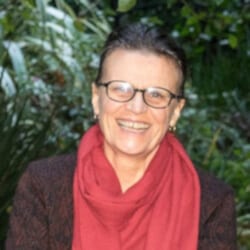Session Resources
Session Leaders

Thanissara embodies the integration of the contemplative with the activist. Trained in the Ajahn Chah Forest Tradition, she was a was a monastic for 12 years. She and husband Kittisaro founded Dharmagiri in South Africa where they integrated activism on AIDS while hosting month long retreats that synthesize Theravada and Mahayana, drawing from the Mantra, Chan, and Pure Land teachings and practices, in particular focused on the Quan Yin Dharma door through the transmission of Master Hsuan Hua. As member of the Spirit Rock Teacher Council, Thanissara later co-founded Sacred Mountain Sangha based in California. She has an MA in Mindfulness-Based Psychotherapy from the UK, and is author of several books, including Time to Stand Up: An Engaged Buddhist Manifesto for Our Earth — The Buddha’s Life and Message through Feminine Eyes.
Opening the Space
We invite you to open your engagement with each session (or group gathering, if applicable) by practicing a Living Earth Acknowledgment. A Living Earth Acknowledgement can nourish our relatedness and avail us to truths beyond domination. Incorporating our ecological nature as well as the calls of justice, it is an exploration, not a formula, to recognize and remember. Through practices like this, we are setting the conditions for shifting minds that are conditioned by domination into more skillful ways of seeing, speaking and acting.
Living Earth Acknowledgment and Prayer
Meditation is an integral part of the EcoSattva journey. If you do not have a meditation practice, now is the perfect time to start. We invite beginners and seasoned practitioners alike to view this guided meditation grounded in our relationship with Earth, created especially for EcoSattva Training participants by our guiding teacher Catherine McGee.
Dharma Offering
To view the video in full screen, click the expand button ![]() on the lower right.
on the lower right.
Inquiries
We offer here a set of inquiries and group practices that support this step in our journey. Consider these suggestions and feel free to customize, replace and augment. But we strongly suggest that you explore at least one inquiry with each session.
Below are this session’s inquiry questions in bold, followed by a short commentary. We invite you to gently hold these questions. If this form of exploration is new to you or you would like a refresher, you can learn more about inquiry practice here.
- What emotions do I feel when I bring our ecological situation to mind?
What do you feel when reflecting on the past, present, and future suffering of ecological crises? Where is the feeling in your body, and how might you describe its characteristics? Does it have a temperature, a shape, a texture? What does it want from you? What happens if you simply allow the feeling to be present? - What blocks my heart from touching the reality of our situation?
Our conceptual minds, miraculous as they are, can conspire to shield our hearts from painful truths. Do you notice any ways in which you avoid or lessen the impact of facing our situation? What is it like to relax with the awareness of these strategies, perhaps even to appreciate that they may be functioning to protect your heart? - What are my spiritual resources for this journey?
What gives you sustenance and inspiration as you engage in this journey of transformation? Whether Buddhism’s classic refuges of Buddha, Dharma and Sangha, the Brahma Viharas, ancestors, rituals, prayer, your friends, your family, or other community, notice what happens when you bring this source of inspiration into your awareness. Do you notice any changes in your embodied experience?
Format for group inquiry: Liberating Structures is an excellent resource and we especially like 1-2-4-all and Conversation Café.
Supplemental Resources (Optional)
- Video and Article: More on the practice of Tonglen practice from Pema Chödrön. Video includes a short guided meditation.
- Documentary recommended by Thanissara: Aluna. The Kogi have made this amazing documentary to help us understand how to avoid the destruction of the world that they are trying to protect, and of ourselves.
- Thanissara’s Blog
EcoDharma Books by Thanissara:
- Time to Stand Up: An Engaged Buddhist Manifesto for Our Earth
- Listening to the Heart: A Contemplative Journey to Engaged Buddhism (with Kittisaro)
- The Heart Of The Bitter Almond Hedge Sutra
In preparation for Session Three, David Loy helps us explore the potential contributions of a Buddhist perspective on ecological crises.
